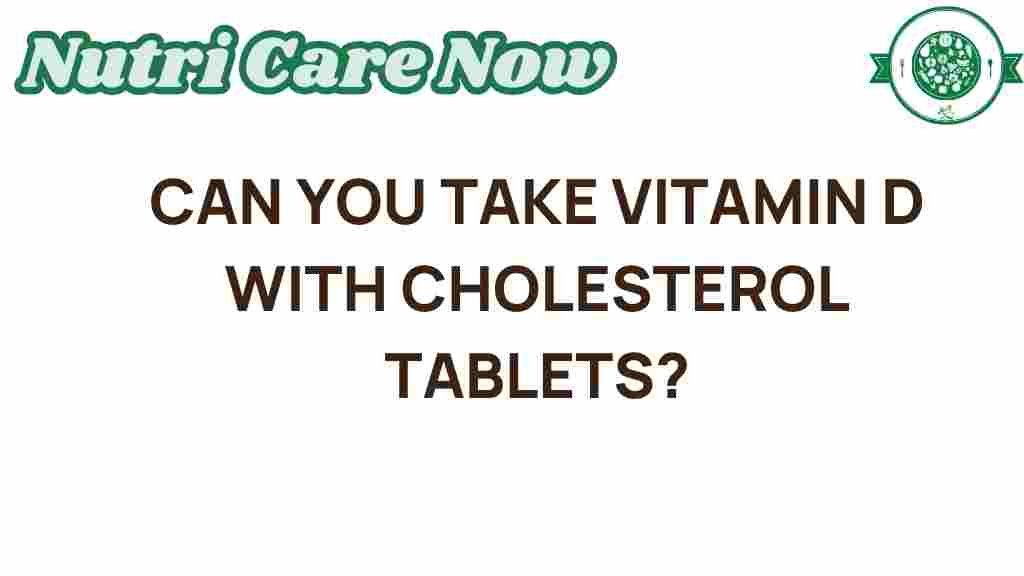The Surprising Connection Between Vitamin D and Cholesterol Tablets
In recent years, there has been a growing interest in the relationship between vitamin D and cholesterol tablets. Many people are now aware of the critical role that these nutrients play in overall health, particularly concerning heart health. As we delve into the connection between vitamin D and cholesterol management, we will explore how these elements interact, their effects on wellness, and how you can optimize your nutrition through supplements.
Understanding Vitamin D and Cholesterol Tablets
Vitamin D is an essential nutrient that helps regulate calcium and phosphate in the body, which are vital for maintaining healthy bones, teeth, and muscles. It also plays a crucial role in immune function and inflammation reduction. On the other hand, cholesterol tablets, primarily statins, are medications prescribed to lower cholesterol levels in the blood, thereby reducing the risk of heart disease.
The Importance of Vitamin D for Overall Health
Vitamin D is not just a vitamin; it is a hormone that influences many bodily functions. Here are some key benefits:
- Bone Health: Vitamin D helps absorb calcium, vital for strong bones.
- Immune Function: It supports immune health, potentially reducing the risk of infections.
- Heart Health: Research suggests a link between adequate vitamin D levels and improved cardiovascular health.
- Mood Regulation: Some studies indicate that vitamin D may play a role in mood regulation and reducing the risk of depression.
How Cholesterol Tablets Work
Cholesterol tablets, particularly statins, work by inhibiting a specific enzyme in the liver that plays a central role in cholesterol production. This leads to:
- Lower LDL Cholesterol: Reducing low-density lipoprotein (LDL), often referred to as “bad” cholesterol.
- Increased HDL Cholesterol: Sometimes, statins can help increase high-density lipoprotein (HDL), known as “good” cholesterol.
- Overall Heart Health: By managing cholesterol levels, these medications help lower the risk of heart disease and stroke.
The Connection Between Vitamin D and Cholesterol Tablets
The relationship between vitamin D and cholesterol is complex but fascinating. Here are some vital points to consider:
1. Cholesterol as a Precursor to Vitamin D
Cholesterol plays a vital role in the synthesis of vitamin D. When your skin is exposed to sunlight, a form of cholesterol in the skin is converted into vitamin D. This means that individuals taking cholesterol tablets may have lower levels of cholesterol available for vitamin D synthesis, particularly if their cholesterol levels drop significantly.
2. Vitamin D and Statin Efficacy
Some studies suggest that adequate levels of vitamin D may enhance the effectiveness of statins. This could be due to vitamin D’s role in improving endothelial function and reducing inflammation, which are crucial for heart health. Thus, individuals on cholesterol medications may benefit from monitoring and optimizing their vitamin D levels.
3. Potential Side Effects of Statins
Statins can sometimes lead to muscle pain and damage, which may be exacerbated by low levels of vitamin D. Ensuring sufficient vitamin D intake may help mitigate these side effects, enhancing the overall wellness of those on cholesterol medications.
4. Absorption and Nutrient Interactions
Vitamin D is fat-soluble, meaning it requires dietary fats for optimal absorption. If you are taking cholesterol tablets that lower fat absorption, it may inadvertently affect your vitamin D levels. Therefore, understanding the timing and method of taking these medications can be crucial for nutrient absorption.
5. The Role of Supplements
If you’re concerned about your vitamin D levels while on cholesterol tablets, consider these steps:
- Consult a Healthcare Provider: Always discuss with your doctor before starting any new supplements, especially if you are on medications.
- Get Tested: Check your vitamin D levels through a blood test to know if supplementation is necessary.
- Choose Quality Supplements: If supplements are needed, opt for high-quality vitamin D3, which is more effective than D2.
Step-by-Step Guide to Optimizing Your Vitamin D Intake
Here’s how to ensure you’re getting enough vitamin D, especially if you’re on cholesterol tablets:
Step 1: Sun Exposure
Try to get at least 15–30 minutes of sun exposure several times a week, depending on your skin type and where you live. Remember that sunscreen can inhibit vitamin D synthesis, so balance is key.
Step 2: Dietary Sources
Incorporate vitamin D-rich foods into your diet, such as:
- Fatty fish (salmon, mackerel, sardines)
- Fortified dairy products and orange juice
- Egg yolks
- Mushrooms exposed to UV light
Step 3: Supplements
If dietary sources and sun exposure are insufficient, consider taking a vitamin D supplement. The recommended daily allowance (RDA) for adults is 600–800 IU, but higher doses may be needed for those with low levels.
Step 4: Regular Monitoring
Regularly check your vitamin D levels through blood tests, especially if you’re taking cholesterol tablets. This will help you and your healthcare provider adjust your supplementation as needed.
Troubleshooting Tips
If you suspect you’re not absorbing vitamin D effectively while on cholesterol tablets, consider these troubleshooting tips:
- Timing of Medications: Take your cholesterol medication at night if recommended by your doctor, as this may improve absorption.
- Maintain a Healthy Diet: Ensure your diet includes healthy fats to aid in the absorption of fat-soluble vitamins.
- Stay Hydrated: Proper hydration can improve overall nutrient absorption and metabolic processes.
Conclusion
The connection between vitamin D and cholesterol tablets is significant and multifaceted. Understanding how these elements interact can enhance your overall health, particularly regarding heart health. By optimizing your vitamin D levels through sunlight, diet, and supplements, you can improve your wellness and potentially enhance the efficacy of your cholesterol medications.
For more information on managing heart health through nutrition and supplements, check out this resource.
Keep in mind that maintaining a dialogue with your healthcare provider about your medications and dietary needs is essential to achieving the best outcomes for your health.
To explore more on the significance of nutrition and wellness, visit this link.
This article is in the category Supplements and created by NutriCareNow Team
